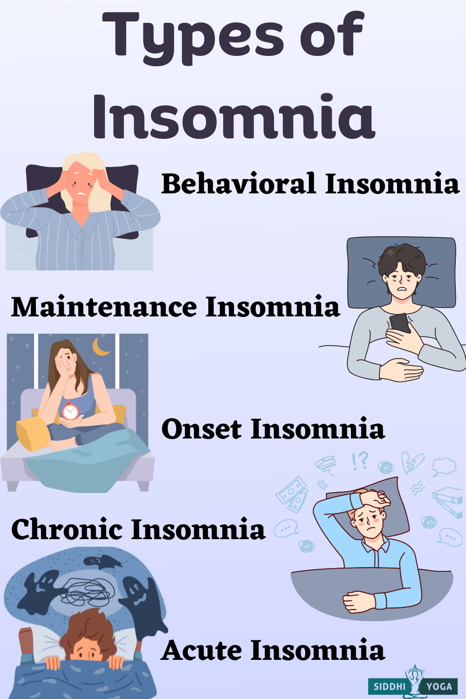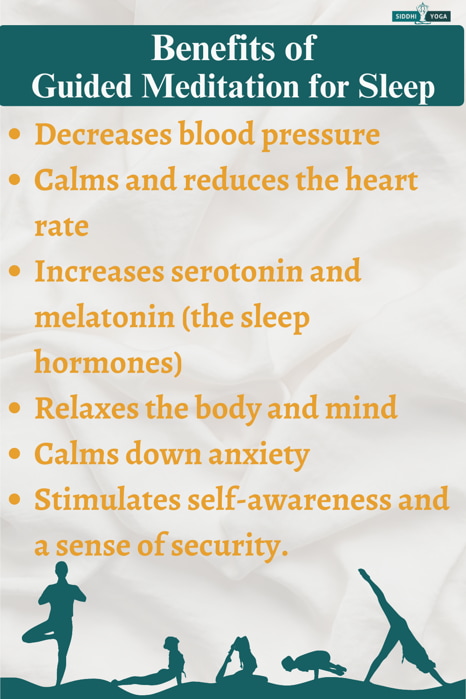
Learn about the different characteristics and causes of Insomnia and find out how guided sleep meditation for Insomnia can help you sleep better.
Introduction
Falling asleep at night might seem like such a natural thing to do, yet many of us suffering from Insomnia have difficulties with that. For many people, sleep disorders are connected to stress. If we ignore the stress we have to go through in our jobs, it could easily develop into chronic stress.
Stress is one of the causes of anxiety, muscle tension and overthinking, which later on may disrupt our sleep pattern or make it more difficult to clear our minds before bedtime.
Meditation is a great tool to try out if you need good sleep. It is relaxing and effective in clearing the mind, which, together with muscle loosening, can support our need for a peaceful and quiet mind before sleep.
Below you will learn how Insomnia impacts your life and how guided sleep meditation for Insomnia may support regulating your sleep.
Guided Sleep Meditation for Insomnia – The Scale of the Problem
Insomnia is a worldwide issue and the number of people suffering from it has been growing exponentially over the last few decades. Due to high stress, a fast and busy daily routine, longer screen time, lack of movement and other factors of our modern life, Insomnia is causing distress and anxiety for more and more people. Sleep difficulties may be defined and put into different categories depending on the characteristics:

Acute Insomnia
Acute or short-term Insomnia occurs when you have sleeping difficulties from time to time, each lasting no more than a few weeks.
Some of the common causes of Acute Insomnia include:
- Stress
- Digestive issues
- Traumatic or emotional event
- Unfamiliar place of sleep – new home, new partner, new bed etc
- Illness or physical pain
- Traveling and jet lag
- Medication
Chronic Insomnia
Chronic, long-term Insomnia is addressed when your sleep is regularly affected for at least three days a week. Usually, it will be diagnosed if it happens in a three or more-month time period.
Some of the common causes of Chronic Insomnia include:
- Chronic physical pain
- Mental and psychological issues
- Sleep disorders, such as sleep apnea
- Chronic stress
- Autoimmune health issues, such as diabetes or thyroid imbalances
Onset Insomnia
Onset insomnia is the difficulty of falling asleep. It might happen due to high caffeine intake, medication, mental and physical health symptoms or it could result from various sleep disorders.
Some of the common causes of Onset Insomnia include:
- High caffeine intake, especially before bedtime
- Medication
- Anxiety and other psychological issues
- Screen time before bed
- Eating before going to bed
- A sudden stressor or trigger
Maintenance Insomnia
Maintenance Insomnia is a term used to explain the difficulty of staying asleep through the night. Frequent waking up and shallow and distorted sleep patterns are the symptoms of someone suffering from Maintenance Insomnia.
Some of the causes of Maintenance Insomnia can be connected to:
- Poor sleep hygiene
- Low levels of blood sugar
- Anxiety and depression
- Stress
- Hormonal changes during menstruation or menopause
Behavioral Insomnia
Behavioral Insomnia refers to children’s sleep difficulties up to five. Dysregulated sleep patterns, problems falling asleep and poor before-bedtime hygiene can lead to behavioral Insomnia. Introducing a regular and consistent sleep practice, such as soothing guided meditation for sleep for children, can be supportive in addressing this issue.
Some of the causes of Behavioral Insomnia include:
- Poor bedtime hygiene
- Screen time before bed
- Not providing a safe and calm environment for bedtime
- No bedtime routine
Addressing Insomnia with Meditation
Meditation stimulates changes in your physical body, mind, emotions and thoughts. It is known to relieve stress and anxiety, help with depression and mood swings, and is also a great tool to deal with Insomnia.
Meditation is often practiced before sleep by improving and spreading a relaxation response through the whole body and mind to calm down, rewind and prepare you for sleep.
As a general practice, meditation can give mental stimulus to energize the mind and keeps us active and awake. Therefore, guided meditation for sleep is done differently. Meditation before bedtime aims to calm and relax the body and mind without concentrating too strongly on the process. We want to get the mind to feel it does not have to focus very strongly on anything, not even relaxation.
When listening to a guided meditation before sleep, listen to a soothing background sound as if you were listening to music. Follow the instructions gently, not in an extremely determined way. With this approach, you will notice that the mind relaxes more and will be more disposed to let go of any focus or thoughts.
Meditation can be beneficial for your sleep in the following ways:

- Decreases blood pressure
- Calms and reduces the heart rate
- Increases serotonin and melatonin (the sleep hormones)
- Relaxes the body and mind
- Calms down anxiety
- Stimulates self-awareness and a sense of security
- Bring you back to the present
Guided Meditation Scripts for Insomnia
Another person leads us to a specific meditation structure during a guided meditation. Guided Sleep Meditation For Insomnia can be followed through an audio recording or face-to-face with a meditation teacher or practitioner.
Usually, a sleep meditation will take you through a body scan and relaxation exercise accompanied by a calm and steady breathwork practice. You will listen to relaxing instructions, visualizations or sounds that may help you rewind and return to your center. Guided imagery or storytelling are some techniques used in guided meditation insomnia practices.
Before bedtime, you may go for one of many recorded online guided meditation scripts for sleep. You may look for them by using the following:
- Meditation podcasts and apps
- Free guided meditation for sleep YouTube videos
- Meditation websites
- Spotify and other online music streaming platforms
The Bottomline
Insomnia and other sleeping difficulties may lead to general distress and discomfort on the energetic, mental, physical and emotional levels. Sleep hygiene is a very important aspect of our life. Guided meditation for sleep helps us find the support we need to establish a bedtime routine. By bringing calmness and a sense of peace, meditation can help prepare the body and mind for a deep relaxing sleep. If you are interested in learning more about the benefits of meditation on your health and well-being, feel free to join our online meditation course at siddhiyoga.com